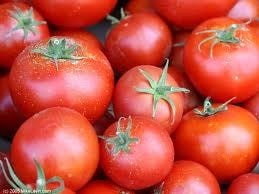Is the powder on tomatoes as toxic as sunflower seeds?
White powder is copper alum or sulfate
Many people believe that the off-white powder on tomatoes sold in the market is actually aluminum sulfate found in sunflower seeds - which is believed to cause brain atrophy in China. Analysis by chemical experts will give readers more specific information about this substance.
White powder is copper alum or sulfate
Information that the authorities of Suzhou city, Zhejiang, China have just discovered that sunflower seeds contain aluminum sulfate which can easily cause brain atrophy has made many domestic consumers worried. Ms. Nguyen Mai Hoan (Tu Liem, Hanoi) said that when she heard that information, she not only did not dare to eat sunflower seeds but also hesitated when using other foods.

Illustration photo.
Specifically, tomatoes sold on the market often have a layer of ivory-white powder on the outside of the skin. According to the seller's explanation, this substance could be alum used to prevent frost. In addition, foods such as skin balls, rice cakes, dried fruits... all use alum as an additive. Even water is used to clean.
“I learned from tomato growers that the ivory-white powder covering tomatoes is alum. People spray alum to prevent frost. In some places, tomato growers do not spray on the area where they use the fruit to eat,” said Ms. Nguyen Mai Hoan.
On February 28, talking to us, Mr. Nguyen Huu Dien - Hanoi Food and Fruit Company - said: The use of alum to process food is quite common, but there has been no report of banning or causing harm to users. As for tomato plants, the pale yellowish-white layer on the fruit could be alum, but most growers use copper sulfate, also known as Bordeaux, which consists of two main ingredients: quicklime and copper sulfate.
Is it toxic?
Analyzing more deeply the chemical components, Associate Professor, Dr. Tran Hong Con - Faculty of Chemistry, University of Natural Sciences (Hanoi National University) - said that the aluminum alum in sunflower seeds is considered toxic, which is also the alum that we are widely using today. Alum is a compound used in many stages of food processing such as making jam, cleaning water... And in the regulations on toxic substances, alum is not included, only the use of residues in food is recommended not to be too large in food.
“Alum must be used to make jam from fruits and plants. Alum helps proteins to contract, making the plants firm when cooked and not mushy. Alum has been used for a long time in folk medicine, so it is very non-toxic,” said Associate Professor, Dr. Tran Hong Con.
Alum is also used in tomato preservation, but very little. If used, it does not affect health as many people worry. Instead, Bordeaux (also known as copper sulfate) is traditionally used by growers to treat leaf curl disease.
The regulation mentions the toxic content of copper sulfate. If at high levels, copper sulfate can cause vomiting, but not death. As for residue on tomato plants, people are not too worried, because copper sulfate is an inorganic substance, mainly adheres to leaves due to many hairs, but on fruit it adheres but less and the permeability through the fruit membrane is not high. To limit this, people just need to soak tomatoes in water and rinse under running water.
Information from the Food Safety Department (Ministry of Health) shows that alum includes two types: single alum (aluminum sulfate) and double alum (aluminum potassium, aluminum ammonium sulfate) or alum solution (usually iron aluminum alum solution, used for settling in domestic water). However, in food production and processing, the Ministry of Health has allowed the use of two types: potassium aluminum sulfate and ammonium aluminum sulfate. Talc powder also has a type for use only in food production and processing, which is on the list of permitted additives.
The Food Safety Department (Ministry of Health) has directed the National Institute for Food Safety Control to collect samples and test sunflower seeds on the market, especially processed seeds imported from China.
According to Laodong-M
